- Home
- Technical Cooperation Projects
- Index of Countries
- Asia
- Thailand
- The Partnership Project for Global Health and Universal Health Coverage Phase 2
- Project News
- The 2nd ASEAN Interprofessional Education (IPE) Workshop
Project News
2022-08-25
The 2nd ASEAN Interprofessional Education (IPE) Workshop
The importance of Collaborative practice (CP) and Interprofessional Education (IPE) has been increasing in the rapid population aging and shortage of health workforce. Therefore, IPE is expected to develop further, especially in the pre-service education of health professionals in Asia. WHO has published guidelines for 'Transforming and Scaling up Health Professionals' Education and Training'. The guidelines state that "IPE may be relevant not only to quantity but also to quality and relevance". It also recommends that "Health professionals' education and training institutions should consider implementing IPE in both undergraduate and postgraduate programmes". Promotion of CP through IPE practice should be considered as one of effective and efficient means to achieve and strengthen UHC..
Based on the such background, GLO+UHC project held an online workshop, that was co-hosted by National Health Professional Education Foundation in Thailand and Gunma University, on 25 July 2022. The aim of the workshop to share the knowledge and discuss on the importance of Interprofessional Education (IPE) in the field of health professional education in the context of UHC among policy makers and academia in ASEAN countries. Around 130 participants from 10 countries, mainly from ASEAN, attended this workshop.
A keynote speaker, Dr. Andreas Xyrichis, Editor-in-Chief of Journal of Interprofessional Care gave a lecture on " Interprofessional Education: importance and trends". He explained many important points including the need for IPE after COVID19. Also, he emphasized that Interprofessional working is evidently and clearly linked to better patient outcomes, staff outcomes, satisfaction for all involved.
Another keynote speaker, Ms. Eriko Anzai, Nursing Officer from WHO WPRO gave a presentation titled "Expectations of IPE to achieve the UHC". She introduced WHO's 2010 Framework for Action on IPE and CP and highlighted the importance of introducing and enhancing IPE & CP at the policy level.
In the following the country presentation session, three speakers from Japan and Thailand shared the situation and challenges of IPE in their countries.
The following points were presented from Japan:
- Overview of IPE initiatives in Japan
- Contents of the Japanese Government's support to promote IPE.
- Current status of IPE implementation in medical schools.
- Challenges to make IPE program more useful and effective are; the perspective on patient safety; competencies for the IPE programme
The presentation from Thailand identified the following necessary elements for the establishment of IPE in Thailand:
- Develop national IPE framework and guideline (Thai and English versions)
- Encourage IPE implementation and strengthen IPE network
- Build capacity of health professional instructors to raise awareness among students
- Share knowledge and experience at regional and global levels
- Provide funding support, promote and support research and publication
Furthermore, new IPE initiatives using IT tools during a pandemic were presented. In addition, the following points were indicated as the next steps:
- Development of IPE assessment tools.
- Scale up implementation at national level
- Collaborate more with neighboring countries
- Host global and regional IPE conferences
Subsequently, a panel discussion was held on the topic "How should the country incorporate IPE into the curriculum for health professionals?", moderated by GLOUHC Project Chief Advisor. The panellists had a lively discussion about transition and development in the IPE field over the past five years, the influence of the COVID-19 pandemic on IPE, and future direction. Along with that, there was a lively Q&A session from workshop participants.
Afterwards, the workshop participants had group discussions on how to assimilate IPE into the pre-service education of health professionals in following their contexts, and summarized the challenges and countermeasures.
GLO+UHC Project and National Health Professional Education Foundation (NHPE) in Thailand are working together on IPE related activities with the support of Gunma University (WHO Collaboration Centre for Research and Training on Interprofessional Education in Japan) from the academic perspective. We plan to launch the joint research project to develop the assessment instruments in several language. We wish to accelerate IPE and IPW toward UHC through promoting IPE assessment tools.
This workshop was hosted by:
- The National Health Professional Education Foundation (NHPE Foundation), Thailand
- Gunma University (WHO Collaboration Centre for Research and Training on Interprofessional Education in Japan), Japan
- JICA GLO+UHC Project.
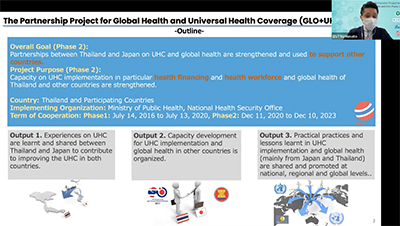
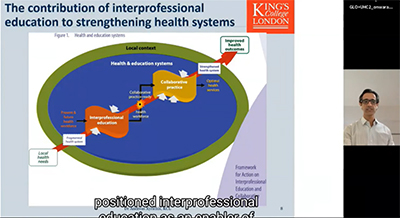
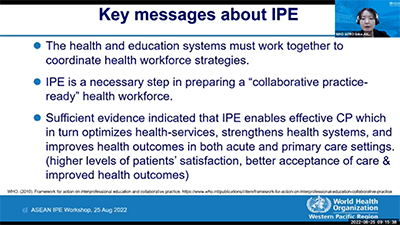
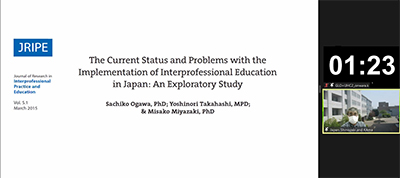
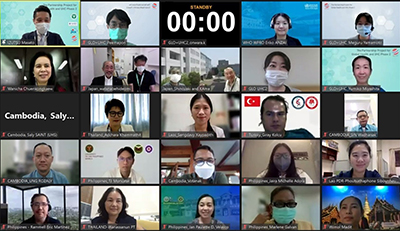
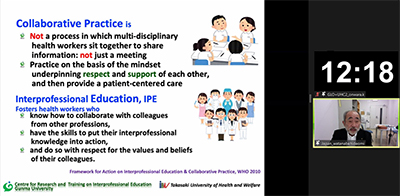
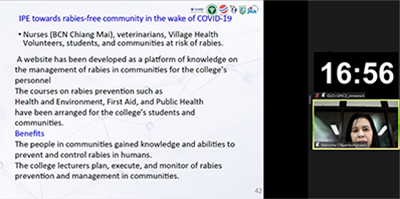
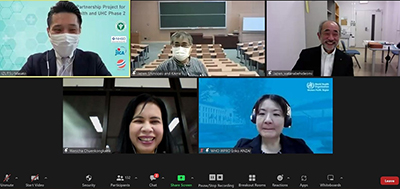
- About JICA
- News & Features
- Countries & Regions
- Our Work
- Thematic Issues
- Types of Assistance
- Partnerships with Other Development Partners
- Climate Change / Environmental and Social Considerations
- Evaluations
- Compliance and Anti-corruption
- Science and Technology Cooperation on Global Issues
- Research
- JICA Development Studies Program / JICA Chair
- Support for the Acceptance of Foreign HRs / Multicultural and Inclusive Community
- Publications
- Investor Relations
